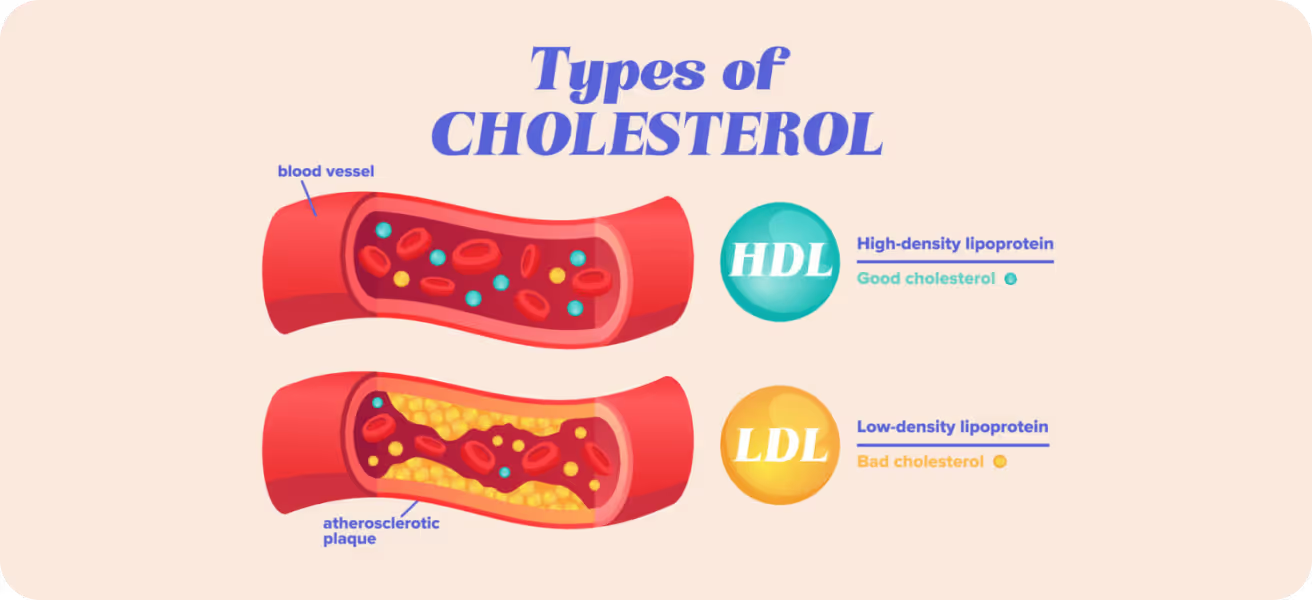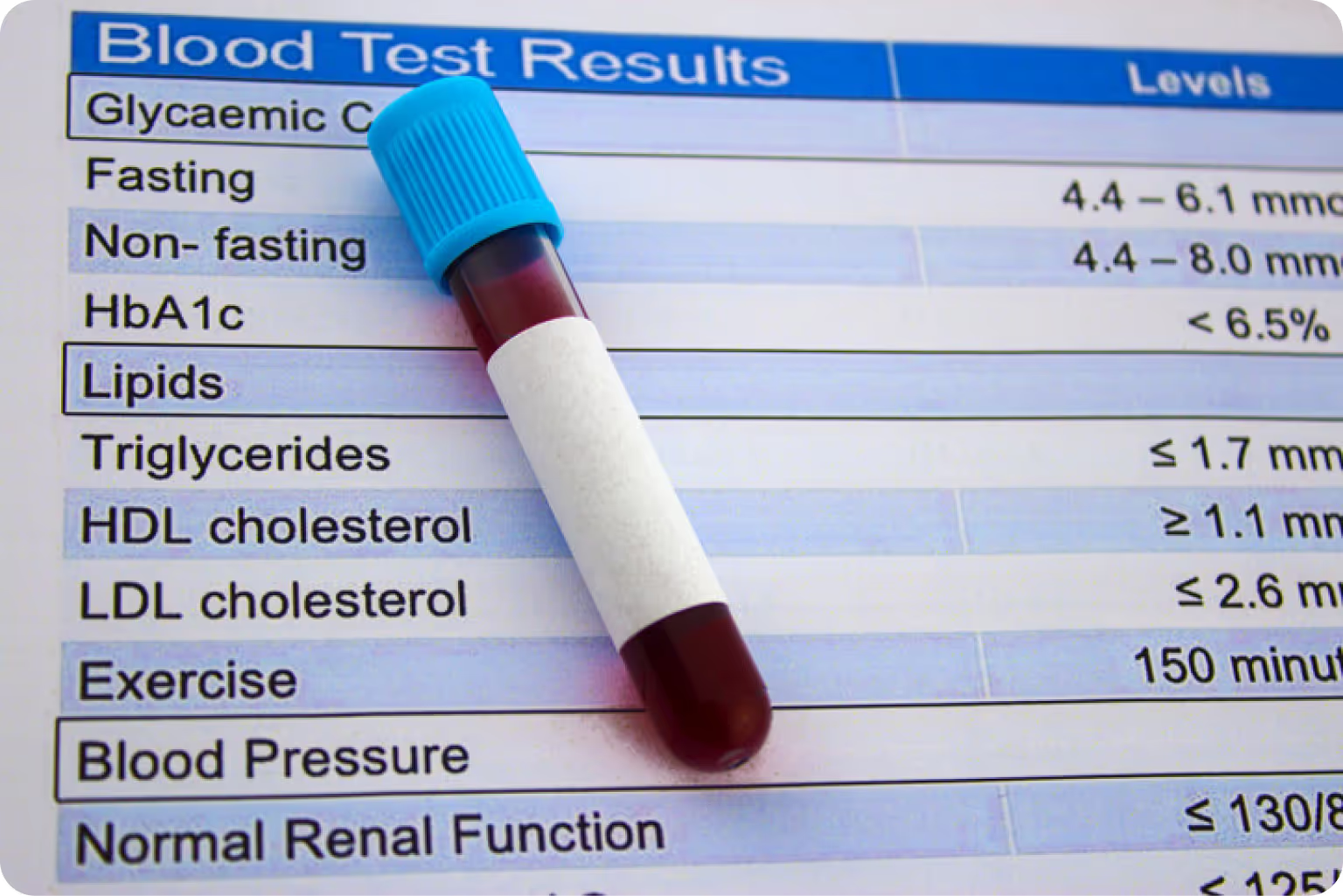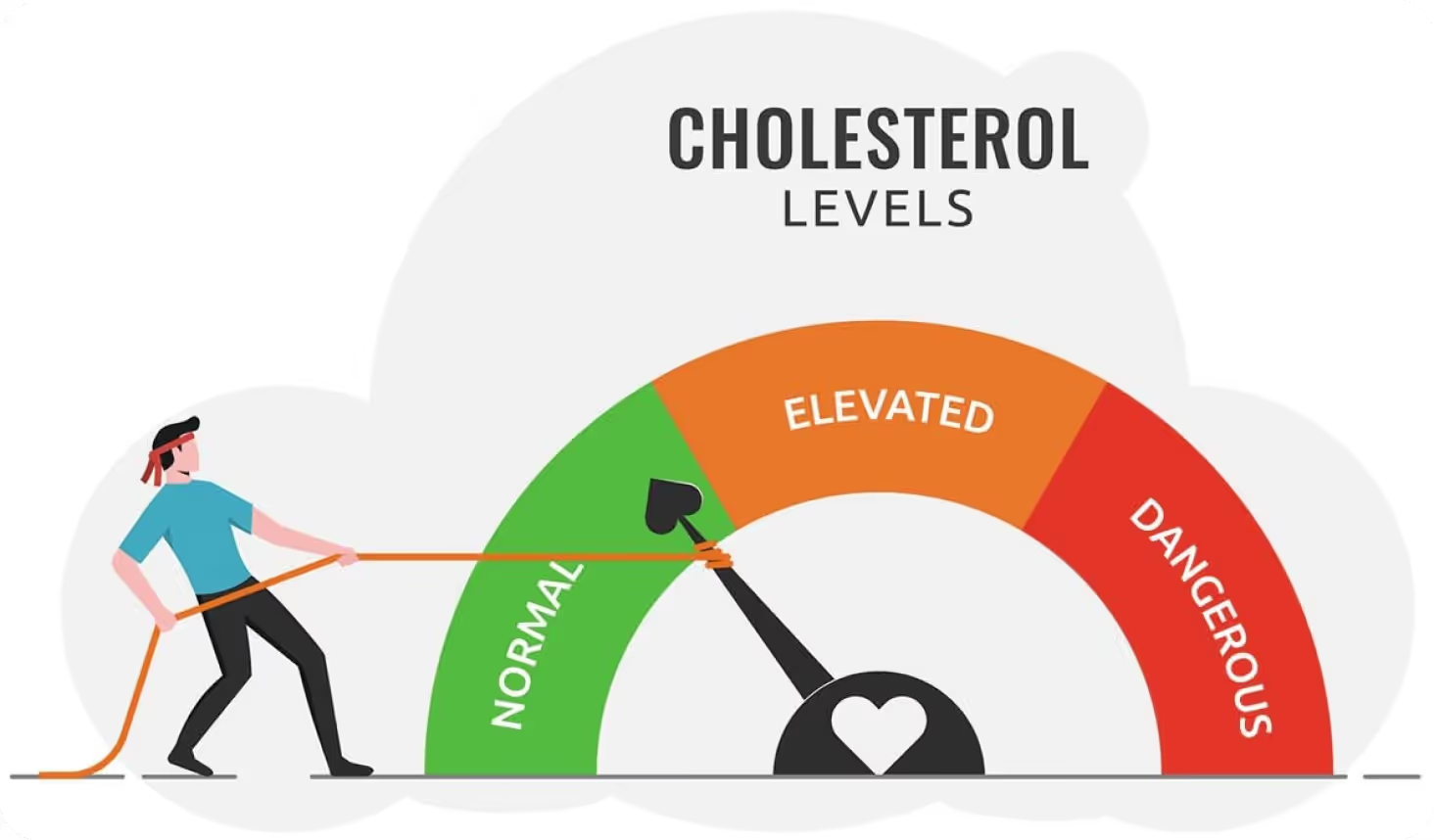High Cholesterol Guide, Symptoms, Causes, Levels & More
Understand what high cholesterol means, its hidden risks, and how HDL and LDL affect your health. Discover causes, symptoms, and treatment options.

High cholesterol is a silent threat that can lead to serious heart problems if left unchecked. But understanding cholesterol doesn’t have to be complicated. Today, I’ll break down the essentials: what high cholesterol is, how it affects your body, the possible causes of high cholesterol and most importantly, what you can do about it. Whether you’re dealing with high cholesterol symptoms or just want to stay ahead of potential issues, this guide is for you.
The only way to know your cholesterol levels is to test them. Book your Everlab diagnostic today and take control of your heart health.
Cholesterol is a crucial yet often misunderstood substance in our bodies. As someone who’s spent years studying health and nutrition, I can tell you it’s not all bad news. Let’s break it down.
Cholesterol is a waxy, fat-like substance that’s vital for many bodily functions. It’s essential for producing hormones, vitamin D, and substances that help you digest foods. However, too much cholesterol in your blood can lead to serious health problems, particularly heart disease. When we talk about "high cholesterol," we’re referring to an excess of cholesterol levels in the blood, which can accumulate on the walls of your arteries and form plaque, leading to a condition called atherosclerosis.
Atherosclerosis narrows the arteries, making it harder for blood to flow through. This can eventually result in chest pain, heart attacks, or strokes.
There are two main types:
This is the "bad" cholesterol. LDL carries cholesterol to your arteries, where it can form plaque and lead to the narrowing and hardening of the arteries. High levels of LDL cholesterol increase your risk of heart disease and stroke, making it crucial to monitor and manage this type of cholesterol. Symptoms of high cholesterol may not appear immediately, but the damage adds up silently over time.
Often referred to as the "good" cholesterol, HDL cholesterol helps remove other forms of cholesterol from your bloodstream. Higher levels of HDL cholesterol are associated with a lower risk of heart disease. It acts like a cleanup crew, transporting excess cholesterol to your liver, where it can be processed and removed from your body.

When you have your cholesterol checked, typically through a blood test called a lipid panel, it measures:
Understanding what are good and bad cholesterol levels is essential for proactive health management: (Everlab reference ranges)
The ratio of total cholesterol to HDL is also crucial. An optimal ratio is 4.5:1 or lower, indicating a lower risk of heart disease.
If your cholesterol levels are outside these ranges, it’s important to work with a healthcare provider to develop a plan to lower your risk of heart disease and stroke.
One of the most dangerous aspects of high cholesterol is that it often has no obvious symptoms. High cholesterol symptoms rarely show up until serious damage has already occurred. That’s why it’s often called a “silent” condition. Many people don’t realise their cholesterol levels are high until they experience complications like chest pain, heart attack, or stroke.
In some rare cases, symptoms of high cholesterol may appear in the form of physical signs. These include xanthomas—yellowish deposits of fat under the skin, particularly around the eyes, elbows, or knees. Another sign can be a grayish-white ring around the cornea of the eye, known as arcus senilis. However, these signs usually appear in people with very high cholesterol, often due to a genetic condition like familial hypercholesterolemia.
Since what causes high cholesterol can vary—from poor diet and lack of exercise to genetics and chronic health conditions—it’s important to get regular blood tests to check your cholesterol rate, especially if you have risk factors like a family history of heart disease, obesity, or diabetes.
If you’re concerned about your heart health, don’t wait for high cholesterol symptoms to appear. Get your HDL and LDL cholesterol checked regularly and speak to a healthcare professional about how to manage your cholesterol levels effectively. Prevention is always better than treatment.
High cholesterol doesn’t happen overnight. It’s a complex interplay of factors, some within our control and others not.
Lifestyle Choices
Our daily habits play a significant role. Eating too much saturated fats, trans fat, and cholesterol can overload our liver’s ability to process cholesterol. Physical inactivity lowers “good” HDL cholesterol while boosting the “bad” LDL. And let’s not forget about smoking - it’s a triple threat, increasing our cholesterol levels, damaging blood vessels, and reducing HDL.
Family History
Sometimes, it’s in our DNA. Familial hypercholesterolemia, an inherited condition, can cause sky-high cholesterol levels from birth. If your family tree is dotted with heart disease you might need more frequent screenings.
Age, Sex, and Ethnicity
As we age, our cholesterol tends to rise. Men typically have lower HDL levels than women. And if you’re of South Asian descent, you might be at higher risk. It’s not fair, but it’s reality.
Health Conditions
Certain medical conditions can throw our cholesterol out of whack. Diabetes, kidney disease, and even some medications can impact our levels. It’s crucial to work closely with your doctor to manage these underlying issues.
By understanding these risk factors, we can take proactive steps to keep our cholesterol in check.
Heart Disease
High LDL cholesterol contributes to the buildup of plaque in your arteries, which can narrow and harden them, leading to coronary artery disease. This can cause chest pain (angina), heart attacks, and other serious cardiovascular issues.
Stroke
When LDL levels creep up, the risks multiply. High LDL can lead to the buildup of fatty deposits (plaque) in your arteries, restricting blood flow and increasing your risk of strokes.
Peripheral Artery Disease
It’s not just about your heart - elevated LDL can also contribute to peripheral artery disease, affecting blood flow to your limbs.
I’ve found that making lifestyle changes is the key to how to manage cholesterol effectively. Here are some proven strategies:
Improve Your Diet
Start by avoiding trans fats and limiting saturated fats. Instead, focus on heart-healthy foods rich in omega-3 fatty acids and soluble fibre. Incorporating more fruits, vegetables, whole grains, and lean proteins into your meals is essential. Opting for plant-based oils like olive or sunflower oil can also make a significant difference in your heart health. For those exploring different dietary approaches, intermittent fasting might be an interesting option to consider. This eating pattern can complement your dietary changes by potentially improving metabolic health and lowering cholesterol.
Get Moving
Regular exercise is crucial for managing high cholesterol. Aim for at least 30 minutes of moderate activity five times a week. Even short bursts of physical activity throughout the day can help boost your HDL (good) cholesterol levels. Keeping track of your exercise levels is a good idea to maintain your cardiovascular health. For those interested in optimizing their workout efficiency, understanding your VO2 max can provide valuable insights into your fitness level. This measure of cardiovascular fitness can guide your exercise intensity to maximize the benefits on your cholesterol levels.
Make Smart Lifestyle Choices
Quitting smoking can quickly improve your cholesterol profile. If you drink, do so in moderation. Losing even a few pounds can have a positive impact on your cholesterol levels. Remember, it’s about making sustainable changes, not drastic ones.
By implementing these natural strategies, you can take control of your cholesterol levels and improve your overall heart health. However, always consult with your doctor before making significant changes to your lifestyle and diet.

In the end, managing high cholesterol is about taking control of your health. I’ve learned it’s not just about avoiding certain foods but embracing a holistic lifestyle approach. Regular exercise, stress management, and a balanced diet rich in fibre and healthy fats can make a significant difference. Remember, your cholesterol levels are just one piece of the puzzle. With the right knowledge and proactive steps, you can lower your cholesterol and reduce your risk of heart disease.
Eat a heart-healthy diet, exercise regularly, quit smoking, reduce alcohol, and manage stress. In some cases, medication may also be necessary.
Yes, diet, exercise, weight loss, and quitting smoking can help lower cholesterol naturally. Soluble fibre and healthy fats are especially effective.
High cholesterol increases the risk of heart disease, stroke, and peripheral artery disease by contributing to plaque buildup in the arteries.
High cholesterol is diagnosed with a blood test called a lipid panel, which measures total, LDL, HDL cholesterol, and triglyceride levels.
Adults should test every 4–6 years, or more often if they have risk factors like heart disease, diabetes, or a family history.
1. Healthline – Everything You Need to Know About High Cholesterol
https://www.healthline.com/health/high-cholesterol
2. Healthdirect Australia – Cholesterol
https://www.healthdirect.gov.au/cholesterol
3. American Heart Association – About Cholesterol
https://www.heart.org/en/health-topics/cholesterol
4. Mayo Clinic – High Blood Cholesterol
https://www.mayoclinic.org/diseases-conditions/high-blood-cholesterol/symptoms-causes/syc-20350800




Join 1000's of Australians improving their health with proactive, personalised healthcare.